 “Postmamboism” is a word you’re probably not familiar with. For writer and historian Ned Sublette, it’s a way of looking at the world.
“Postmamboism” is a word you’re probably not familiar with. For writer and historian Ned Sublette, it’s a way of looking at the world.
“It’s a term that I made up to describe what I had done in my three books (Cuba and Its Music, The World That Made New Orleans, The Year Before the Flood),” Sublette says. “I used music to read history.” He describes postmamboism as a “portable theory that places music at the center of understanding and uses music to interrogate other fields of study.” The practice treats music as a lens through which to view other aspects of human society.
This Monday, Sublette will give a talk at UNO in which he will apply his analytical methods to the cultural history of New Orleans – or more accurately, to one specific part of it. The title of the talk is “Uptown and Downtown New Orleans as Musical Plate Tectonics,” and in this metaphor, Canal Street is the fault line.
“Afro-Cuban and African-American music are two very different musical systems,” Sublette says. “You have an Anglo-American, African-American, English-speaking Protestant culture in the Northern Hemisphere and you have an Afro-Latin, Catholic culture in the Southern Hemisphere,” says Sublette. “Canal Street is precisely the point where the two meet. In the 19th Century, it was practically a national boundary. It was where the French-speaking part of town – the French Quarter – left off and the English-speaking part of town began. It’s a frontier.” Sublette is primarily interested in New Orleans prior to the last century, when ethnic and geographic delineations were much starker. “The boundaries today are not what they were. I’m looking at it from a historical point of view more than I’m trying to read the tea leaves of today.”
He argues that music contains, in microcosm, all of the culture that surrounds it. “If you listen to music deeply, there’s all kinds of information in it. Cuba and Its Music was a history of music, but in order for that music to be comprehensible I had to tell the political history, I had to tell the cultural history, the ethnic and demographic histories. Sociology, anthropology, linguistics, pretty much any humanistic discipline – you can look at it from the point of view of music.”
“Mambo” is a word with origins in Africa, difficult to translate into English. “’Postmamboism’ refers to that which came after the world was changed by African culture manifested in music,” says Sublette. “Postmamboism has a huge connection to New Orleans because so many of my friends in New Orleans are Postmamboists. They come from wide range of academic disciplines, but all of them find themselves listening intently to music and relating their specialties to that.”
Ned Sublette gives the talk, “Uptown and Downtown New Orleans As Musical Plate Tetonics: A Postmamboist Looks at Canal Street” Monday at 4:30 p.m. in Engineering 101 (at the corner of Founders Road and Leon C. Simon Boulevard) on the University of New Orleans campus.




